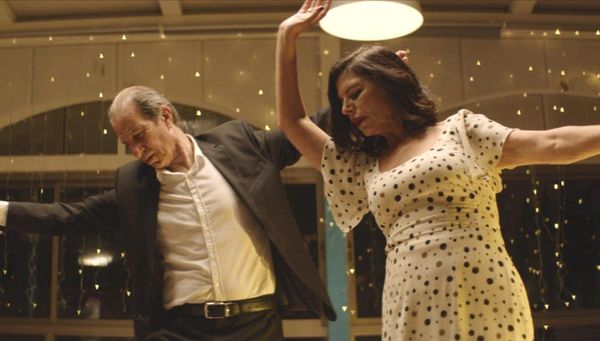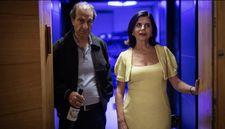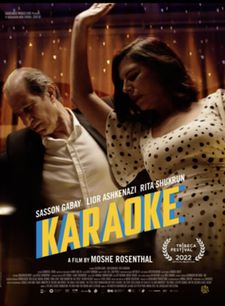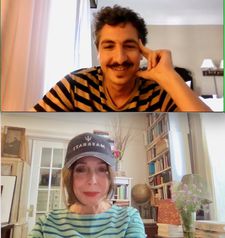 |
| Sasson Gabay and Rita Shukrun star opposite Lior Ashkenazi in Moshe Rosenthal’s neighbourly Karaoke |
Oscar-winning director Martin Strange-Hansen (This Charming Man) and two-time Oscar-winning producer Kim Magnusson (Anders Walter’s Helium and Anders Thomas Jensen’s Election Night) this year had Martin’s Live Action Short On My Mind receive an Oscar nomination. In On My Mind, a man walks into an unfamiliar bar with no patrons. He wants to sing karaoke. It has to be “You were always on my mind” and it has to be right now.
In Moshe Rosenthal’s feature Karaoke, a highlight of the 21st edition of the Tribeca Film Festival, Lior Ashkenazi (Joseph Cedar’s Norman, opposite Richard Gere and Michael Sheen, and Samuel Maoz’s Foxtrot) stars as Itsik, a fun loving, Maserati-and-motorcycle-driving mysterious new neighbour who seductively sings karaoke-style his rendition of Lady d'Arbanville (Cat Stevens’s song, arranged by composer Gal Lev) in his penthouse apartment to married couple Tova (Rita Shukrun) and Meir (Sasson Gabay). Karaoke is the story of their enchantment and reawakening.
Lior Ashkenazi embodies the magician trickster who will dazzle the lives of the inhabitants of the apartment complex. The life he breathes into them turns out to be worthwhile - print the legend, if you will.
From New York City, Moshe Rosenthal joined me on Zoom for an in-depth conversation on Karaoke.
Anne-Katrin Titze: Hi, Moshe, we are both in stripes I see!
Moshe Rosenthal: Hi, actually a moment before we started I had another striped shirt, this one [he shows it to me]. I have a collection of stripes.
AKT: I also have a prop for you! [I put on my Maserati cap]. Can you read it?
MR: Ah! Of course. I want it!
AKT: I got it at the Morgan Library & Museum. It was an event for Isabella Rossellini or Stephen Sondheim or something like that. Frédéric Boyer, when I talked to him about what’s coming up in Tribeca, he was the first one to point out your film to me. What was the starting point for you for Karaoke?
 |
| Moshe Rosenthal on Lior Ashkenazi as Itsik: “I knew that he was the right person for it. I kind of wrote the role for him.” |
MR: I think it started from observing my parents in a way. Even though they are in their mid-to-late sixties, they still have this surprising longing for a change. It reminded me a lot about when I was 16, when I was a teenager. And I thought it might be a very similar period in life, before your pension and in high school, that you are about to change your life completely and you’re excited and waiting for somebody to kind of like sweep you away.
It made me feel that I could tell something that is very personal to me, like my own coming-of-age story but through characters that are very similar to my parents. I always had this strange longing to tell stories about people in that age group. I’m assuming it has something to do with me trying to understand my parents better and communicate with them in ways that I can’t.
AKT: It’s very interesting what you say about the overlap of ages. Time isn’t really linear, we’re going through cycles in our lives and something suddenly reminds us of an earlier time. You realise, oh yes, when I was seven, I really liked this or that. For the agent of change in your film you couldn’t have chosen a better actor than Lior [Ashkenazi].
 |
| Lior Ashkenazi with Anne-Katrin Titze at the US theatrical premiere of Norman Photo: Gary Springer |
I did the post-screening discussion with him for the US theatrical premiere of Norman in New York. And we had some great conversations after that. He is spectacular in your film as well. The character he plays is such an interesting catalyst. He himself doesn’t change much. He is the classic trickster figure.
MR: First of all, I think it came from my personal experience, knowing narcissistic people in my life that groomed me and made me feel like they’re the agent of change for my life. Then slowly realising and being disappointed because their role in my life has much more to do with what I projected onto them than what they really are able to promise. I think that that was the approach with this character.
To use him to be the catalyst for Meir and Tova and also to see between the lines that he is also a lonely man. We do understand that he has this need to make people fall for him. He finds meaning out of that and it eventually covers a very lonely existence. I was trying to explore that in a way that wouldn’t steal the depth of my main characters.
AKT: It’s fascinating because he is needed. He is far from perfect, the lonely trickster character of myth. I love that we don’t know where he ends up, because characters like him are always in-between. But how much he can accomplish for others! People so often need a push to suddenly come alive!
 |
| Tova (Rita Shukrun) and Meir (Sasson Gabay) on their way to Itsik’s (Lior Ashkenazi) karaoke party |
MR: I kept thinking about who would Itzik be for each character? He has a chameleon aspect in his character. It’s a character that hides its truth with so many faces. Eventually you have to accept that the truth is all of them. And with Lior it was really easy to get there.
Lior as a person is one of those people that people project so much on. I knew that he was the right person for it. I kind of wrote the role for him. I worked with him on a short film of mine that we did a couple of years ago and I remembered the day that he entered the set for the first time. I noticed that everybody was completely enchanted by him. Like the boys, the girls, the young, the old - everyone. It made me realise that some people have to carry their charisma.
AKT: Ha, that’s a beautiful way to phrase it! But there’s also a method to that. As I learned from my own grandfather and from Lior when I talked to him. He told me how much he loved Burt Lancaster when he was a boy and watched movies with his father. Some of that charisma is also trained. He is perfect in this role because of the enigma that comes with it. Had the other actors known each other before or did you put them together in this slightly dysfunctional couple?
 |
| Lior Ashkenazi in New York for Samuel Maoz’s Foxtrot Photo: Anne-Katrin Titze |
MR: Israel is a small country, it’s a small industry, so if you get to a point in your career chances are that you know the usual suspects. They all knew each other. Lior and Sasson are very good friends. Both knew that the other must do the opposite role. They were very invested in working together because I don’t think they were together on screen before.
I know that Rita and Sasson are friends for probably like thirty years now. It came very natural to see them as a couple. They have a familiarity that made it very believable. The relationship was there from day 1.
AKT: I noticed that you have a lot of screens in the background. The TV is always on, the karaoke machine is talking in the penthouse, there is always some distraction. There is Dr. Shakshuka. I only know this as a brunch meal that I make with eggs and red peppers. Did you invent him?
MR: Dr. Shakshuka is a real figure in Israeli cuisine. It was mostly just to create this world that portrayed that specific Israeli middle-class culture. It has a lot of television in it, a lot of distractions. Images and aesthetics of wealth but at the same time there is something - I don’t want to say fake, but there’s something that’s just the symbols of wealth and the symbols of a cultural identity.
 |
| Anne-Katrin’s Shakshuka, not Dr. Shakshuka Photo: Anne-Katrin Titze |
You can see through those elements the nuances of class struggles. I’m trying to be very calculated and not sound like I’m criticising. When you go to the middle class of Israel you can see this strange mixture of culture, conservative on one hand, and a lot of capitalist elements that make everyone strive for success. Putting aside that there’s the Sephardic Jews and the Ashkenazi Jews, I wanted to describe the nuances.
AKT: All in one apartment block, one high-rise. The elevator scenes, the going up and down, the cars in the garage, the billboard - all illustrate love thy neighbour, but not really. The men compete in one way, the women in another. Meir’s hair colour change is rather touching. The hair colour dripping is so Death In Venice, Aschenbach, Dirk Bogarde, a Visconti moment. Or, more recently, Rudy Giuliani’s hair dripping incident. Tell me about your thoughts on the hair colouring!
MR: It’s very strange how some ideas go through an evolution with you. Since I was a student, there was always a scene in every movie I made that at some point something dripped on the face. It always fascinated me, I have no idea why. It’s a very cinematic moment. I had this image of him smiling in the camera with the drip that tells the story in one image. It’s very tragic but also kind of funny and in Karaoke I was always trying to find that balance.
 |
| Karaoke poster |
AKT: Lior’s character is a bit like The Wizard Of Oz for the neighbours. He is giving them, despite being a fake as the Wizard is, something that they really need. Courage, heart, whatever energy. Were there movies you thought about?
MR: It’s funny, when people talk about film inspirations, my inspirations always sound so disconnected from the actual project. I remember talking with Sasson about The Graduate.
AKT: I can see that!
MR: Just the tone of The Graduate and the feeling of disconnection to the environment that you’re living in. Having a rebellious moment in your life. Even Fight Club, a lot of movies that I loved as a teenager inspired me to bring all that energy into Meir’s character.
AKT: The costumes are interesting, especially her crocodile shoes and the way they dress up for penthouse guy but also for each other. Tell me about your work with the costume design!
MR: Actually it’s funny, because I’ve had a wonderful costume designer, who is called Yam Brusilovsky. We were shooting during COVID times so it was very hard to find the specific things I was looking for. At one point I realised I can allow myself to take a little more inspiration from my mother. So I told Yam to just come to my mother’s closet and let’s do it! We also brought Rita to my parents’ house and she met my mother.
And then my mother started taking out her dresses and most of the things that Rita is wearing are my mother’s dresses, including the crocodile on the shoe. It was actually on a sandal that my mother used to have and I remember always being completely fascinated by it. It was like a cheap plastic sandal and the fact that it had that diamond crocodile on a plastic sandal - I really loved that image.
You know, if you take that plastic sandal with that diamond crocodile, it’s a good symbol for a lot of the aesthetics in the film. This strange combination of what is considered cheap and what is considered fancy and operatic and keep playing with both of those images.
AKT: Thank you so much. Hats off to you and your beautiful film!
MR: Thank you! I hope I answered wisely!
AKT: Wisely and well.
Karaoke is available for viewing on the Tribeca Film Festival At Home platform through June 26.






















